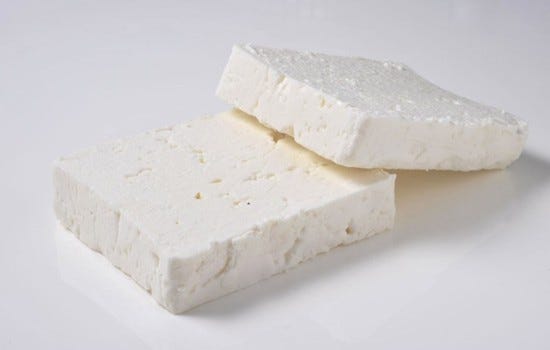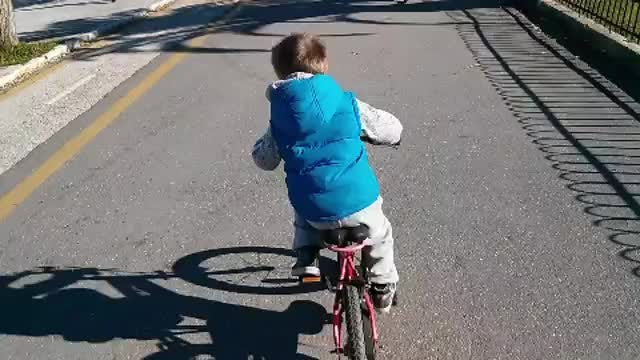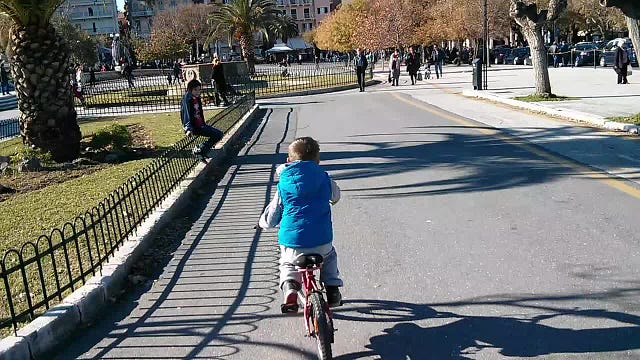Welcome to the 36 awesome new folks who joined us over the holidays! If you have not subscribed yet, join 1,978 smart, curious people Changing Greece by subscribing here:
🪄 D̶o̶n̶'t̶ Do It Fedon!
If you were anywhere near a Greek TV screen in 2009, you’ll probably never forget this.
During a live performance of the TV show "The Successor of Uri Geller” in Greece, a contestant named Neofitos (Fedon!?) was ready to do something really dangerous. The camera then zoomed at Uri Geller, the famed illusionist and critic of the show. Uri stood up “in total shock” and shouted four simple words: “Don’t do it, Fedon!”
Et, voilà. This is how the most famous meme in the modern Greek era was born.
Uri’s punchline was funny and dramatic at the same time. It became an instant classic in the zeitgeist of a country that would soon become a synonym of the financial crisis.
Why is this meme relevant?
Greece is trying to move away from its last crisis. We’re trying to re-invent ourselves.
This means doing more and better things. Putting our money where our mouth is.
We need to remove the collective “don’t” from the equation. Cross it out. Just do it.
But what does doing really mean?
Definitely not performing something as (potentially) self-harmful as the televised skit of illusionist-hopeful Fedon with Uri Geler. That’s TV. No, real life is different.
Doing means F.E.T.A.
The F.E.T.A. framework
“Wait, what? Why on earth are we talking about feta? If I wanted to read about delicious Greek cheese I’d go directly to a cooking blog.”
I can hear you murmuring. But, fear not. We are not here to talk about Greek cheese, no matter how delicious it is. We are here to talk about F.E.T.A. — a framework of thinking I believe Greece desperately needs.
(If you think I came up with the acronym just for fun, you are dead w-right.)
So, what does F.E.T.A. mean? F.E.T.A. stands for:
Failure
Effort
Toughing it Out
Action
All four elements are interlinked and necessary parts of doing more and better things.
Let’s look at each of these elements one by one.
1. Failure
Greek society is fundamentally geared towards castigating failure. If you failed once you are often forever considered a failure. Failure is not considered a part of learning or a prelude to success. It is an anathema of epic proportions, to be avoided at all costs.
It often starts early: “Look how successful Maria’s son is. He got into Athens Med School. If you got better grades you wouldn’t have ended in a second class university!”
And it continues forever: “Did you hear about George? His company went out of business. What will he ever do again with his life now? He is completely destroyed!”
Failure is simply not allowed. We have elevated the reputational cost of failure so high that we have forgotten how important it is to making us better versions of ourselves.
But failure is not just necessary for growth.
Failure is an essential prerequisite for success.
2. Effort
Failing is nothing without effort. Scattershot approaches, half-way attempts and doing things in sloppy ways do not produce systematic learning or build intuitiveness.
Greeks have a peculiar relationship with effort. We certainly work a lot. But do we do not always work productively.
We often also seem to act as if someone else — the government, the EU, the world and sometimes even the universe — owes us the outcome of our results simply because we exist. This makes us avoid trying hard to influence the outcome ourselves.
Meaningful effort requires not just putting in the hours. It also demands we zone in the task at hand, try everything we can to solve a problem and keep on hammering until we make some good progress.
3. Toughing it Out
Greeks tend to complain — a lot. One could say we are a “country of complainers.”
Complaining is not bad in and of itself. There are many aspects of life in Greece that require fixing. Plus, we all have our individual problems that keep us busy. It only becomes a problem when this is the only thing we do.
Venting has become a national sport for Greece, part of a (collective) therapy session. This often hides the incredible resilience Greeks have shown — and keep showing — as a nation.
We have toughed out a lot through our recent history. 400 years of Ottoman rule. A brutal occupation by Nazi Germany. A deeply traumatic military junta. More recently, a decade-long devastating financial crisis. And we are still here to tell the tale.
We need to remember more often how tough we are (or can be, in moments of crisis). It is a powerful reminder, one that helps build perspective.
4. Action
Last but not least: we need to take action.
Apathy, cynicism or constant nagging will not take us far — or anywhere at all, really.
We need to become active participants of the society we want to live in, the business successes we want to create, the economic reality we want to usher in, the future we want to build for our children, the change we want to see in the world.
This requires taking risks, making difficult decisions, doing things that are scary.
We need to think big. Not just at a personal level but also a societal one.
If we want to make new inventions and discoveries, erect the greatest monuments in the world, celebrate big national wins, create proud moments of historical significance, give birth to noble statesmen, enable world leading scientists, build era defining companies — we need to take action.
Otherwise, we will end up missing 100% of the shots we never take.
Bravo, Fedon!
Now back to where we started — the Uri Geller meme. How can we redefine it?
We actually don’t have to! 15 long years after the initial meme with Fedon, the universe has come full circle and delivered a new one.
A(nother) wild Fedon appeared! This time round, he is much younger and also doing something far more scary and difficult than reality TV magic: young Fedon is now learning how to bike without any support wheels for the first time in his life!
Fedon’s first attempt ends with a crash. Despite the positive verbal support of his father, he is not able to control his bike (just yet) and ends up falling.
 Tiktok failed to load.
Tiktok failed to load.Enable 3rd party cookies or use another browser
The video became an instant viral hit. Even Greek PM Mitsotakis referenced it in one of his pre-electoral TikTok videos prior to the last election.
Most people focused on the hard landing of Fedon. It quickly became a synonym of making a blunder, with thousands of people uploading videos of efforts that ended in small (or big) mishaps.
But this video was only part of the full story. His father also released a new one.
In this new video, Fedon is on his bike again, pedalling hard with the excitement of any young kid feeling this two-wheel freedom for the first time.
This time, he actually makes it. Fedon stops in time and delivers a masterful finish!
 Tiktok failed to load.
Tiktok failed to load.Enable 3rd party cookies or use another browser
I hope we can be more like young Fedon in our lives.
Trying out something, Failing, putting Effort in all that we do, Toughing it out, trying again, and taking Action until we eventually become successful.
Let’s make F.E.T.A. our mantra for Greece in 2024.
It might be cheesy, but I promise it works.
Thank you Uri, Neofitos (Fedon!?) and Fedon Jr (and his dad) for the inspiration.
🙌 Greece is Changing
New investments are taking Greece by storm. Let’s first have a quick look at public investments: these reached €11.2bn in 2023. According to the Ministry of Finance, the annual program was executed in full (100%) and surpassed 2022 by €176M. Giant public construction works of €30bn until 2030 are also underway, comprising more than 180 large projects across the country.
If we look at the private sector, virtually every sector is benefitting from the ongoing investment boom. Investments in real estate are still booming and energy projects are picking up. RRF funds keep flowing. Tech giants are building new bases of ops, data centers and talent hubs all across the country. With heavy investment in the logistics sector, Greece’s rise from 72nd to 19th position in the Logistics Performance Index is bringing big shifts across all industries.
Microsoft’s €1bn data centers investment has been added in the ‘fast track’ category by the government. Fourlis is planning €300M in real-estate investments over the next 4 years. Boehringer Ingelheim is investing €120M to expand its production facility in Koropi. Lidl wants to invest €120M over the next 3 years. Ionniki Sfoliata is planning €30M in investments this year after being acquired by SwitzGroup. Zeus International is planning to bring another €30M of fresh capital into the hospitality sector. Sanoptis is expanding its investment in building an ophthalmology network in the country.
It is not a coincidence that PM Mitsotakis is campaigning about bringing investments to Greece at every big venue he attends — from Davos to NY. This is an important target for the government and an undeniable value driver for the Greek economy. Nevertheless, the mix of investments is still heavily skewed towards real estate and hospitality, and there are many key areas we are either lagging in or underutilizing.
As Niko Efstathiou points out about this new flow of investments into the country: the tough bet of getting Greece into a path of sustainable growth has only just started.
💰 Economy
General Commercial Register (GEMI) launches public stats for Greek businesses. A true revolution for any data nerd who loves business statistics, economist looking at macro data or investor who wants to better analyze the Greek market. Sadly, it’s still only available in Greek. Hat tip to George Tziralis for sharing this great find.
Jefferies is long Greek banks. The American multinational investment bank seems to think that there is a lot of remaining upside in Greece’s top financial institutions.
Business startups outpaced closures in Greece for 2023. 57K new startups created and 20K businesses closed. Startups up +14.7% and closures down -6.3% vs 2022.
Greece has 30 businesses in the semiconductor space. A steep increase from just 5 a few years ago. Great to see the country build a larger presence in this critical industry.
Industrial production index was up in November, marking a 3.1% YoY increase. Industry represents 2nd largest contributor to Greek GDP (and 3rd to jobs creation).
🤖 Tech & Startups
Greek founded startups raised $1.1bn in 2023. According to Marathon VC, the number was $2.7bn in 2022 and $4.5 in 2021. Numbers from the latest Found.ation annual report show that local Greek startups remain resilient and were valued around $9bn in 2022. While funding rounds and sizes have been subdued, this should not be attributed to a lack of dry powder (in fact, a ton of new Greek VCs are raising or have closed new funds). My hunch is that there might be newfound selectiveness of Greek early/mid stage investors and few proper support channels. We need to deploy more.
Halcyon Equity Partners raising a €160M fund by end 2024 ($115M first closing). The team aims to invest in mature scale-ups and growth level companies in Greece.
Two Greek-founded companies made it into YC W24. The two startups are Piramidal (AI translating brain activity) and BetterBasket (end-to-end merchandising for F&B).
Blueground expands to Japan. Harbor Lab expands to India. Two top Greek scaleups — one a leader in short-term furnished rentals, the other in maritime — growing fast.
JPMorgan hiring for a number of tech roles in Athens. JPM has been expanding its presence in the country continuing steadily despite ongoing jitters with VivaWallet.
Feel Therapeutics raised a new funding round. The Greek-founded team uses objective data to help transform how we diagnose, manage and care for mental health.
PhytoMines wants to help the mining industry tidy up after itself. The London-based startup co-founded by Ion Ioannou is still very early but shows great promise.
👷 Founders corner
Key learnings about startupping from the founder of Transifex. Dimitris Glezos gives valuable lessons from his startup journey in his new blog. First post covers his learnings as a technical founder about sales when he acted as an interim Sales VP for his former SaaS business; second post explains his dilemma in selling Transifex and the process of getting acquired by PARC Partners.
Great interview with the co-founder of Softomotive. Greek tech entrepreneur Argyris Kaninis shares his journey from co-founding a business to selling it to Microsoft and now being an angel and mentor to a new generation of Greek startups.
A glimpse into a security and defense startup built in Greece. Dimitrios Kottas, co-founder of Lambda Automata, talks about the company’s journey in the defense space.
What do we need to know about digital currencies? Nikos Andrikogiannopoulos, co-founder of Metrika, explains how his company monitors and risk assesses blockchains.
Why is the fast and proper diagnosis of genetic disorders important? Read the moving story of Christos Kyriakidis, co-founder of gMendel, and you will understand.
What do founders wish they knew before starting out? Hear from the young Greek co-founders of Daphnis and Chloe, Blakbear, Woli and The Tipping Point.
🏅 Celebrating Greek wins
New Aerospace Engineering Department founded at UNR is led by Greek expert. A $36M gift will help propel the ongoing efforts of legendary Prof. Petros Voulgaris in building one of the top aerospace engineering programs at the University of Nevada, Reno. Christos Papachristos, another Greek academic at the same institution, is also making great strides in the domain.
2024 is the “Year of Lord Byron and Philhellenism.” Big kudos to the Society for Hellenism and Philhellenism and the Philhellenism Museum for spearheading this effort with a series of events prepared throughout the upcoming year.
Digital management agency Reborrn turns 6. The cutting edge Greek startup is growing fast, expanding from ATH to LDN. Read their story in this wholesome video.
Greek government launches MyAuto Folder. Soon, every citizen will be able to access all of their relevant automobile documents seamlessly in their Gov.gr Wallet. Love it!
Ten Million Hands champions sustainable consumption, supported by The Helidoni Foundation and Impact Hub Athens. Read their recent interview and amazing report.
❓ A question for the weekend
Earlier this week, I asked this question on X:
The question received many great answers: faster adjudication of court cases, better sidewalks, tax incentives for young families, more reliable public transport, proper monitoring mechanisms, more traffic cameras, higher penalties for tax evasion, whistleblowing systems, cleaner cities, and a less complex tax system.
What do you think? Message me or reply to this e-mail with your answer.
That’s all for this week. Thanks for reading!







I dig the F.E.T.A. mantra. But I think the "failure" part is the root cause. This mindset leads to less action, which in turn leads to fewer chances to practice the "effort" and "tough it" out part. I know we aren't doing math here 😁, but I think this is our most persisting cultural weakness being perpetuated down to young people.
We simply can't grasp the power of this phrase you mentioned. "Failure is a necessary prerequisite for success"
Civil Society and positive, productive not politicized activism are not well developed in Greece. It is compelling to fight the indifference and individualism that prevent people from caring for the common good. I guess this could be part of FETA in some extent .